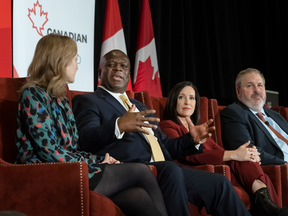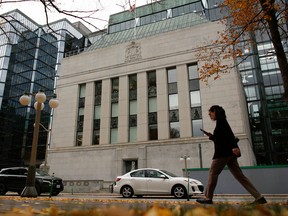Carolyn Rogers warns interest rates aren’t likely to return to pre-pandemic levels any time soon
Article content
Bank of Canada senior deputy governor Carolyn Rogers laid out the central bank’s view of the interest rate path going forward at an event in Vancouver Nov. 9 and indebted Canadians may not like what she had to say. The Financial Post’s Ian Vandaelle breaks down four key takeaways from Rogers’ speech.
Higher rates are likely here to stay
Article content
In her prepared remarks, Rogers said that Canadians expecting a return to the ultra-low rate environment of the last decade and a half may be sorely disappointed, noting the rock-bottom rate environment in the wake of the Great Financial Crisis was an outlier, not the rule.
Advertisement 2
Article content
That means Canadians hoping to wait out the storm may be waiting a long time — if it happens at all.
“People buying homes or renewing their mortgages these days are facing the highest borrowing costs they’ve experienced in a long time or — in many cases — ever,” she said.
“It can be tempting to think those very low rates will eventually return. But there are reasons to think that may not happen.”
It’s outside the Bank of Canada’s control
While the Bank of Canada does exert control over its benchmark rate, Rogers noted there are a bevy of factors outside the bank’s control that feed into inflation. Geopolitical risks, including the war in Ukraine and the increasingly bifurcated global trade order both have the potential to continue to raise the price of goods, for example.
Another structural issue at play is the wave of Baby Boomers retiring — not only does that remove a substantial amount of labour capacity from the system, retirees tend to shift from saving to spending, adding demand into the economy. Rogers said while the outcomes do remain to be determined, the risks are tilted toward higher inflation in the long term.
Article content
Advertisement 3
Article content
“All this obviously involves a lot of uncertainty. But it’s not hard to see a world where interest rates are persistently higher than what people have grown used to.”
Canadians are already adapting to higher rates
While the full brunt of the Bank of Canada’s rate increases has yet to be felt — typically, it takes between 12 and 18 months to see the full effects work their way through the system — Rogers said there are signs consumers and businesses are already starting to adapt to this new normal.
Rogers highlighted slowing credit growth, both on the mortgage and durable goods side of the ledger, as a key sign higher rates were taking some of the heat out of the economy. While the Bank of Canada has seen credit-card use tick higher, along with delinquencies, it has yet to see mortgage delinquency rates reach pre-pandemic levels, indicating Canadians are still finding a way to stay in their homes by pulling back on spending elsewhere.
More adjustment is coming
While so far consumers and businesses have been able to adapt to the rising rate environment by shifting spending behaviours, Rogers said the real test is yet to come. A key area the Bank of Canada is watching for signs of stress is the mortgage market, where it estimates that around 40 per cent of borrowers have seen higher payments since early 2022. That number will rise to virtually all mortgage holders in 2026, when the last of those five-year mortgages signed through 2021 come due for renewal.
Advertisement 4
Article content
It’s a similar story on the business side — according to the Bank of Canada’s latest Business Outlook Survey, nearly half of the companies surveyed said they thought the impact of higher rates was just beginning for them.
Related Stories
-

Bank of Canada worried government spending could impede inflation fight
-

Canadians will likely have to wait until next summer for rate cuts
-

Why Bank of Canada is about to take more rate hikes off the table
In all, Rogers said the central bank would be keeping a tight focus on those pressure points as it gauges the impact of a higher-for-longer rate environment.
“It’s early though, and the effects of higher interest rates are still working their way through the economy. We’ll need to keep a close eye on both credit stress indicators and survey data to gauge how businesses and households are adjusting.”
• Email: IVandaelle@postmedia.com
Bookmark our website and support our journalism: Don’t miss the business news you need to know — add financialpost.com to your bookmarks and sign up for our newsletters here.
Article content
Bank of Canada’s Rogers says ultra-low interest rates may not return
2023-11-10 11:00:50









Comments
Postmedia is committed to maintaining a lively but civil forum for discussion and encourage all readers to share their views on our articles. Comments may take up to an hour for moderation before appearing on the site. We ask you to keep your comments relevant and respectful. We have enabled email notifications—you will now receive an email if you receive a reply to your comment, there is an update to a comment thread you follow or if a user you follow comments. Visit our Community Guidelines for more information and details on how to adjust your email settings.